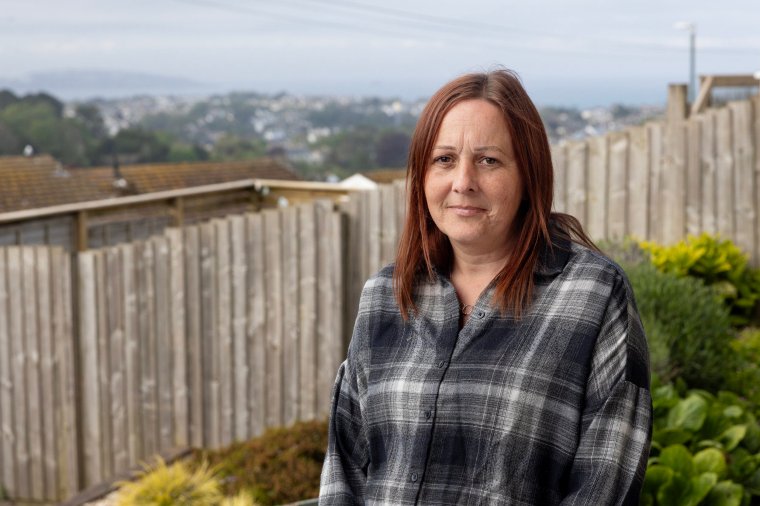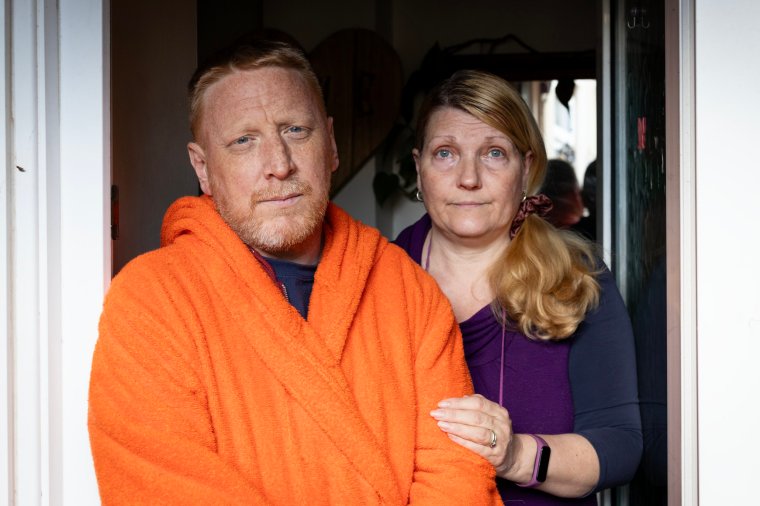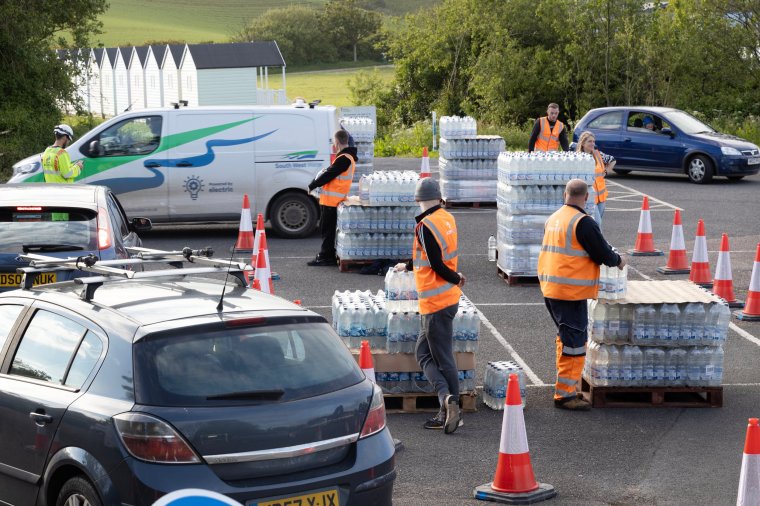Locals in a Devon town who are unwell with symptoms of a waterborne disease said they started feeling ill more than a week ago – but were only told to stop drinking their tap water today.
South West Water has urged residents in Brixham to boil their tap water before use after finding it contained traces of a highly infectious parasite.
Residents in the tourist hotspot, which has a population of around 16,000 people, told i that entire families had fallen ill and that they had been left with diarrhoea and stomach cramps “like childbirth”.
The UK Health Security Agency (UKHSA) has confirmed 22 cases of a diarrhoea-type illness caused by the waterborne parasite cryptosporidium in the south Devon town.
Dozens more people in the town claim to have also become ill, and the UKHSA told i that other cases of diarrhoea and vomiting in residents and visitors to Brixham are also under investigation, with more confirmed cases anticipated.
The local MP said there were, so far, around 70 further reported cases of diarrhoea and vomiting, but local people believe there could be hundreds more.
Official Government advice on the illness warns that “cryptosporidiosis is highly infectious” and can be passed via human-to-human contact as well as between animals and humans.
After being made aware of the outbreak of the illness on Tuesday afternoon, South West Water initially claimed tap water in the town was safe to drink, but the company has now confirmed it has found a pollution incident that could have led to the parasite making its way directly into people’s homes.
The firm changed its advice at 1pm on Wednesday afternoon and is investigating to identify the source. It said that tests carried out in the last few weeks showed the water leaving its treatment works was “not contaminated”.
Tanya Matthews lives on Ocean View Drive where almost every home has had at least one family member showing symptoms of the illness for well over a week.

“Every house on this street has had it for well over a week,” she told i. “I’ve still got it. My husband is in bed with it now. My kids have got it.
“South West Water was still telling us the water was safe to drink early this morning.”
Lisa Horswill, another resident of Ocean View Drive, is also showing symptoms.
“It’s worst after you’ve just eaten,”she said. “Then the diarrhoea just empties you out and the stomach cramps kick in, which are so painful, like child birth.
“It just keeps coming in waves. You keep going backwards and forwards and backwards and forwards and then got you’ve got no appetite.

“South West Water have told us we’re getting £15 in compensation, but we’ve spent more than that on bottled water.”
Ms Horswills’ husband added: “I’ve spent more than that on toilet roll.”
Another Brixham resident affected by the illness is Michaela Lewis. She claims her five-year-old daughter has been ill with symptoms of cryptosporidiosis for 12 days.
“She’s been really ill with it,” she said. “What does this sort of thing do to such a young person’s stomach? It can’t be good for young children.
“As for vulnerable people, how is this going to affect them?”
A spokesman for South West Water said: “Customers in Alston and the Hillhead area of Brixham are advised to boil their drinking water before consuming after new test results for cryptosporidium.
“We are issuing this notice following small traces of the organism identified overnight and this morning.”
Adults with cryptosporidiosis are advised by the Government to stay away from work and pupils are told not to go to school until they are no longer showing symptoms for at least 48 hours.
South West Water added: “We are working with the UKHSA and other public health partners to urgently investigate and eliminate the source. We apologise for the inconvenience caused and will continue to keep customers and businesses updated.”
Conservative MP for Totnes Anthony Mangnall said it was “enormously frustrating” that South West Water has not been quicker to respond, citing the firm’s initial denial.
“Residents were quick to actually point out there was something wrong with the water, they could taste it, and now they are suffering,” he said.
He said residents in Brixham, Boohay, Kingswear, Roseland and north-east Paignton were all being advised to boil their water for drinking, cooking and cleaning.
On Wednesday afternoon, South West Water began setting up bottled water stations in the affected areas of Brixham.

But some locals are unhappy with the firm’s response.
One said: “This is South West Water’s fault. I have a kidney disease and my doctor has told me I have to come off my meds because my stomach can’t take them at the moment.
“What about people worse off than me? How is it going to affect them?
“South West Water are a complete disgrace. They’re already pumping sewage into the seas around here.
“The water bosses need to be hit in the pocket for this.”
As residents tried to find out where they could collect free bottled water, workers for South West Water were on site at what many locals believe to be to source of the issue. At the reservoir closest to the centre of the outbreak, temporary traffic lights had been put up to allow space for South West Water personnel to park their vans.
One trailor being taken into the site was emblazoned with the boast “delivering you top quality tap water”.
This is not the first time the water company has been linked to the existence of cryptosporidium in Devon rivers.
A report into a major outbreak of the gastrointestinal illness in August 1995 may have been linked to a sewage treatment works operated by South West Water, according to National Rivers Authority data.
The report found that treatment works had discharged cryptosporidium into the River Dart at the time of the outbreak and water containing elevated levels of the organism was being abstracted for public supply only a few miles downstream.
Cryptosporidiosis is predominantly a waterborne disease, and infections can be caused by drinking contaminated water or swallowing contaminated water in swimming pools or streams. It can also be acquired by animal and human contact, according the the UKHSA.
Sarah Bird, consultant in health protection at the UKHSA South West, said: “We advise people in the affected areas to follow the advice from South West Water and boil their drinking water and allow [it] to cool before use.
“Anyone with a diarrhoeal illness should drink plenty of water to prevent dehydration and if they have severe symptoms like bloody diarrhoea, they should contact NHS 111 or their GP surgery.”
Symptoms of the illness, which usually clears up after two or three weeks, include watery diarrhoea, stomach pains, dehydration, weight loss and fever.
Anyone can get cryptosporidiosis, but it is most common in young children aged between one and five years, and Ms Bird said “most healthy people will recover fully”.
She added: “For most people, cryptosporidium symptoms can be managed at home without needing medical advice.
“Those affected should stay off school and work for 48 hours since the last episode of illness and away from swimming pools for 14 days after the last episode of illness.”
UKHSA advice if you are infected by cryptosporidiosis
What is cryptosporidiosis?
Symptoms of cryptosporidiosis include watery diarrhoea, stomach pains, dehydration, weight loss and fever, which could last for up to three weeks, but people with weak immune systems can be affected for longer periods.
How do you treat cryptosporidiosis?
There is no specific treatment for cryptosporidiosis. Most people with a healthy immune system will recover within one month.
It is important to drink plenty of fluids as diarrhoea or vomiting can lead to dehydration and you can lose important sugars and minerals from your body. Your doctor may recommend a re-hydration solution, available from your pharmacist. If you feel sick, try taking small sips of fluid, frequently, and avoid alcohol.
A simple painkiller can help with abdominal cramps. Talk to your GP or pharmacist who can advise you on the most appropriate painkiller for you.
Do I need to stay off work or school?
Yes. While you are ill and have symptoms you are infectious. You should not return to work or school until you have been free from diarrhoea and/or vomiting for 48 hours.
You should tell your employer you have had cryptosporidiosis if you work with vulnerable groups such as the elderly, the young, those in poor health or if you handle food.
If your symptoms become severe, you should contact your GP.
Cryptosporidium parasites can be found in soil, water, food or on any surface that has been contaminated with human or animal faeces.
It is spread through animal-to-human or human-to-human contact. People can also become ill by consuming contaminated water or food, or by swimming in contaminated water such as lakes or rivers.
Infection is frequently associated with foreign travel.
Anyone suffering with a diarrhoeal illness should not swim for two weeks after their symptoms have stopped and, as always, it is important to shower immediately before entering and after leaving a swimming pool.



